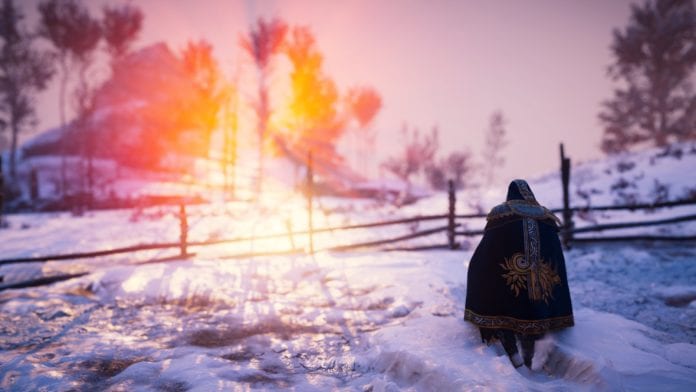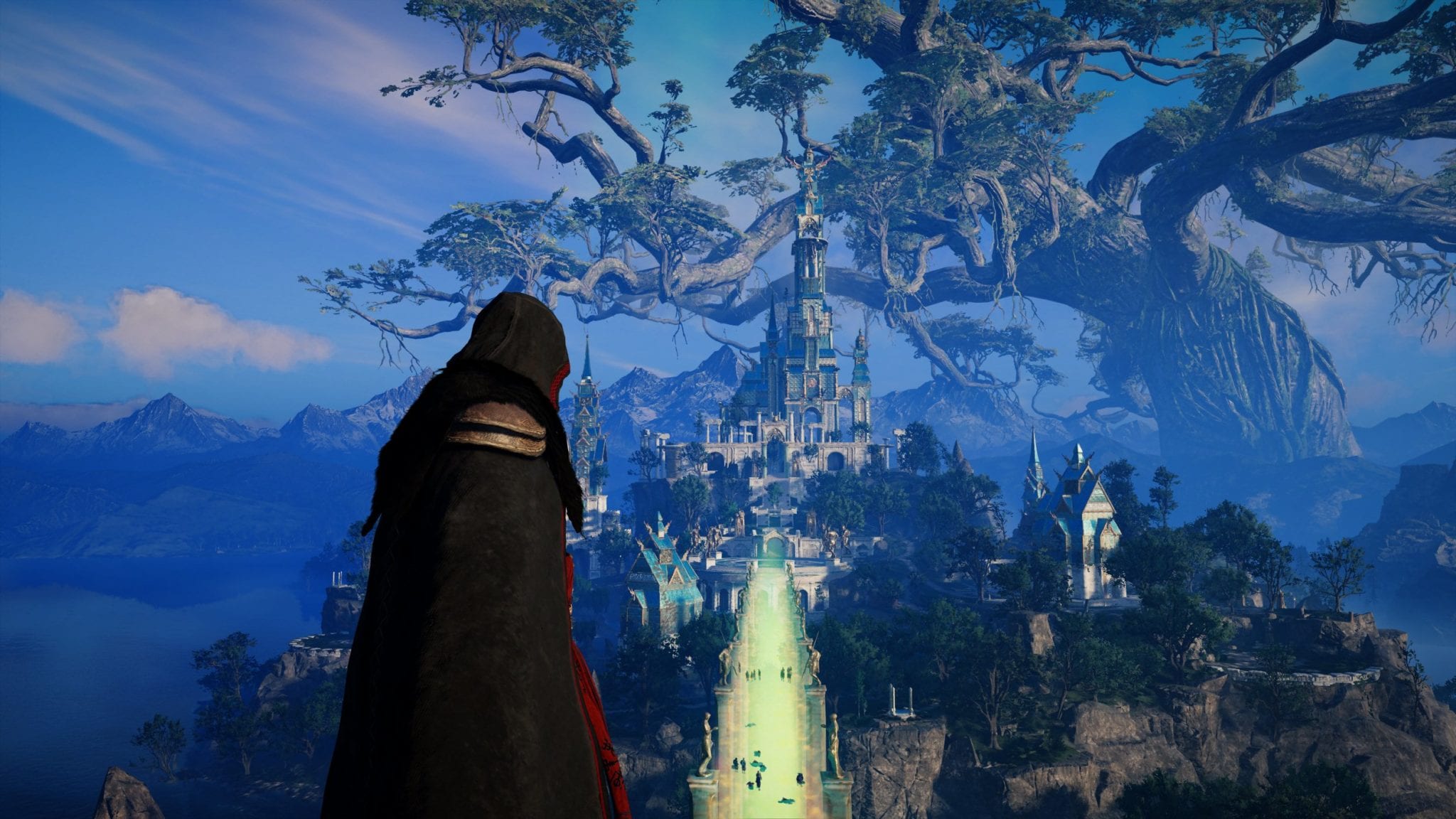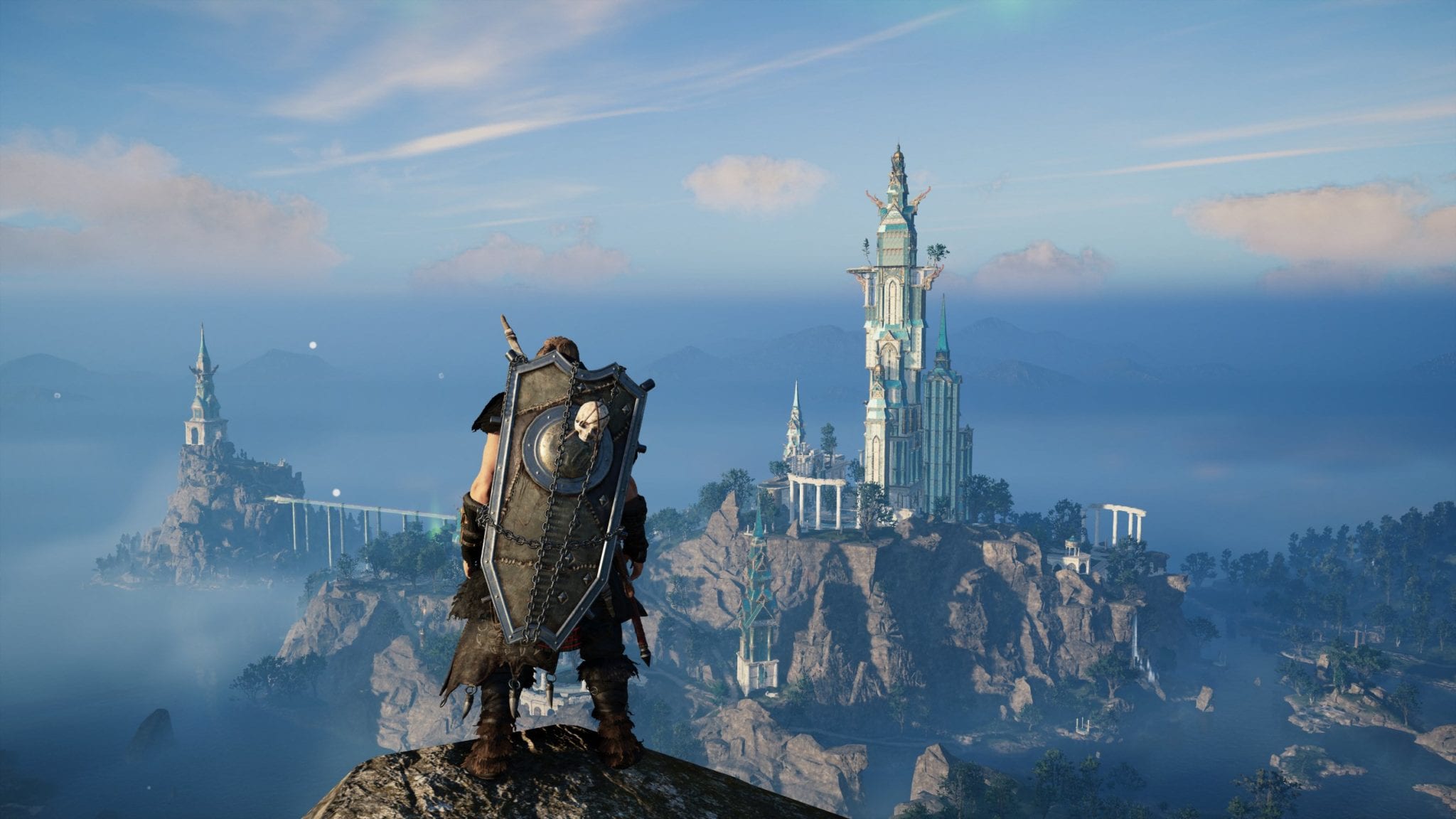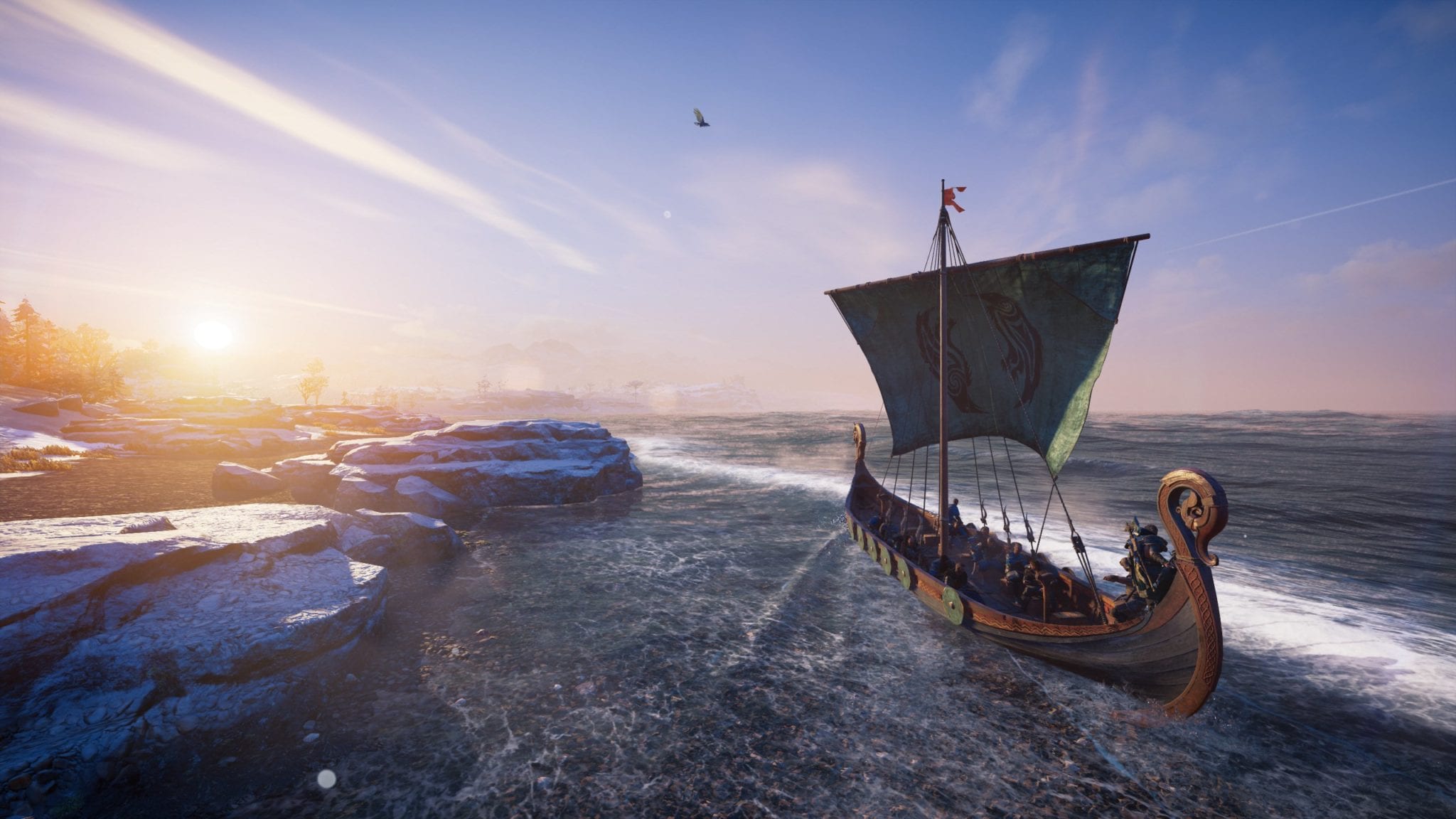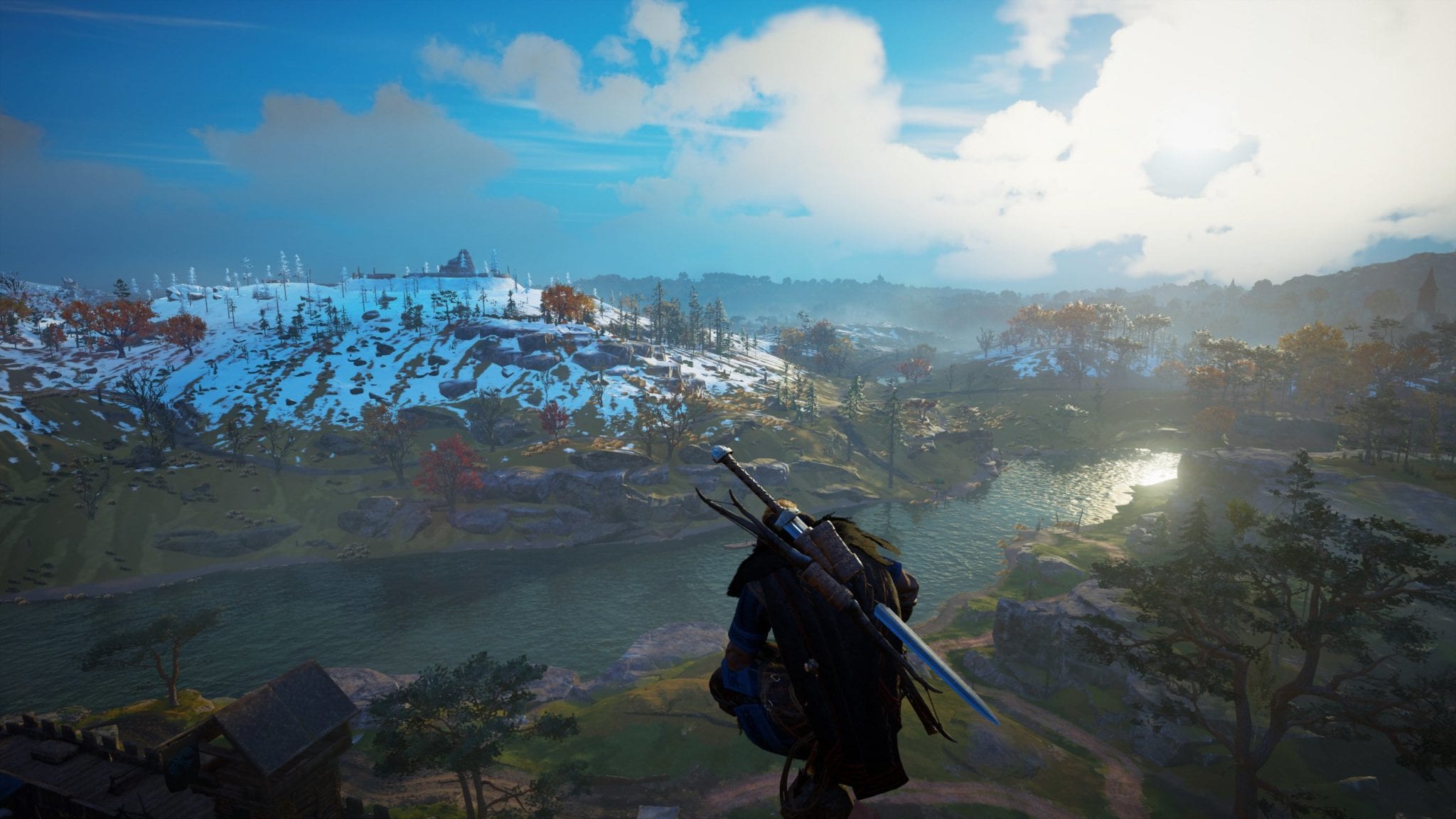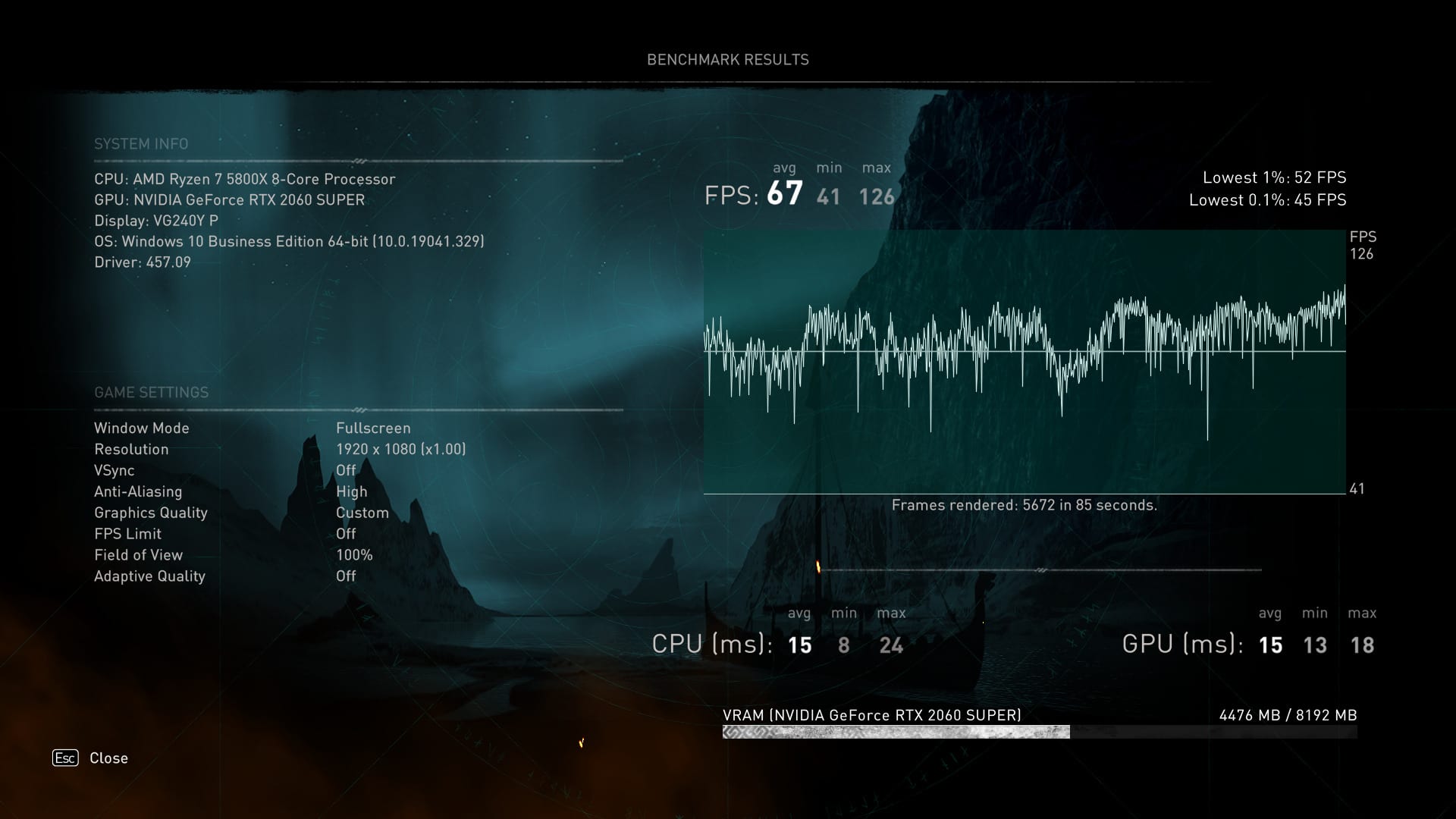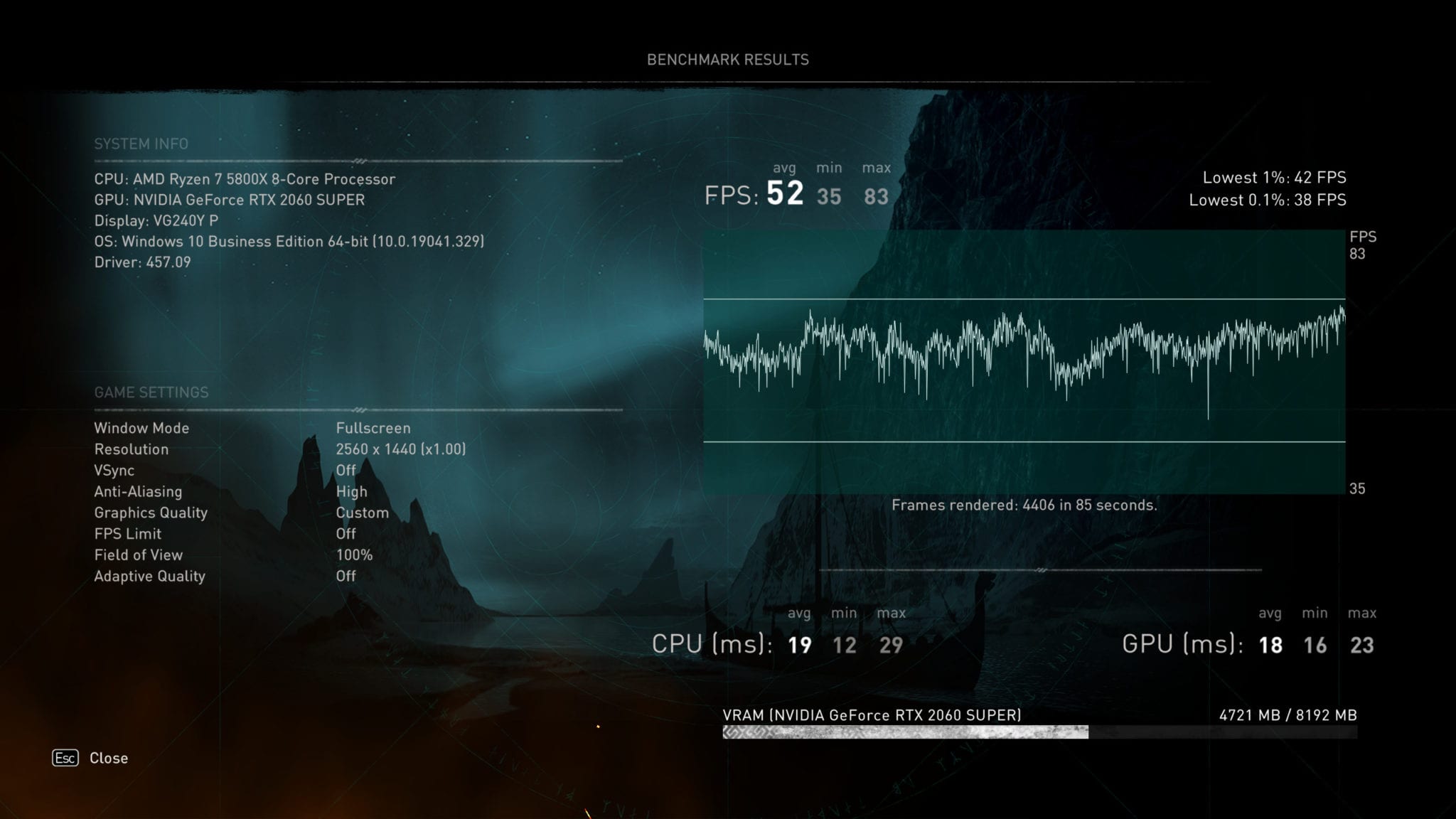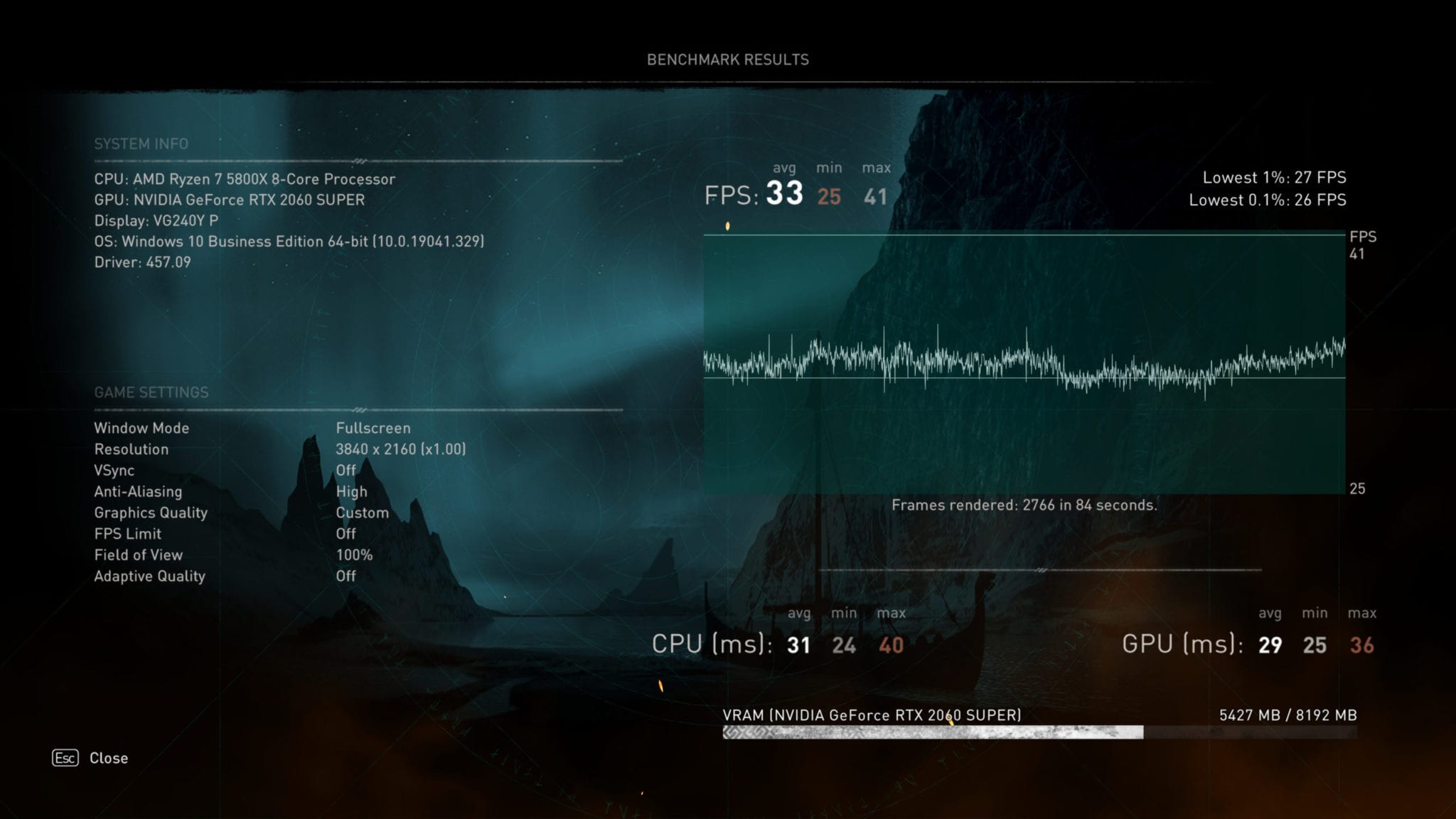Assassin’s Creed Valhalla is the 12th major instalment in Ubisoft’s historical open-world franchise, and yet still isn’t showing any signs of ageing for a franchise that old. The game, developed by Ubisoft Montreal primarily, is the final chapter in the relaunched trilogy that started off with Assassin’s Creed Origins and is one which finally nails the balance between a fully-fledged RPG and pays respects to its predecessors.
The Story So Far (and How Odyssey Betrayed Its Own Franchise)
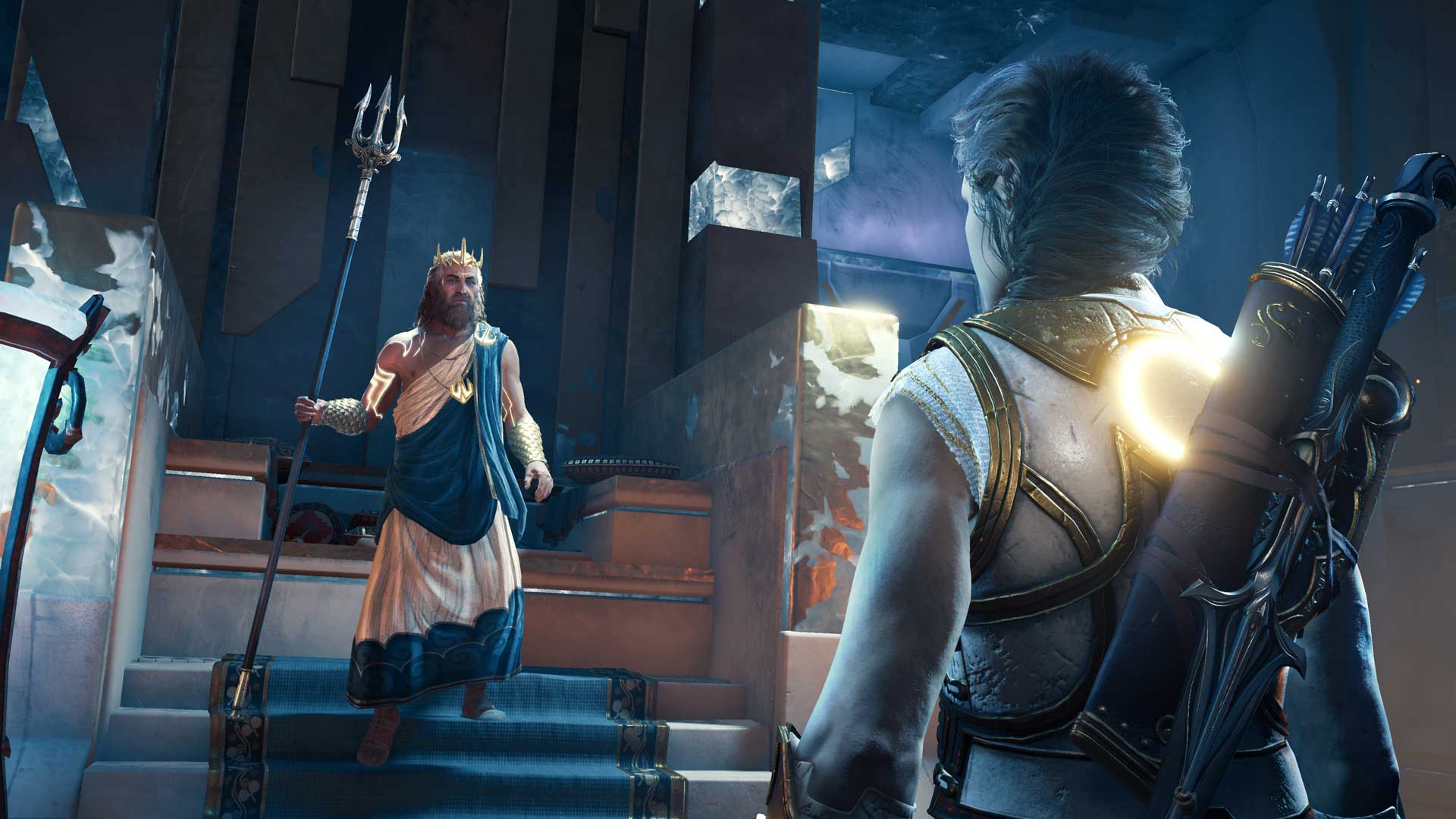
In order to properly discuss Assassin’s Creed Valhalla, we must look to the past. When Ubisoft relaunched the series with a focus on RPG mechanics in Origins, many fans were left confused. It was a start change in direction from the previous games, and ultimately one for the better. It greatly expanded the open world and introduced completely new mechanics with a decreased focus on stealth. It also introduced a completely new chapter in the modern-day storyline, with a new playable hero in Layla. Origins remains one of the franchise’s riskiest moves, one which I think paid off well for Ubisoft as the franchise had started to become really stale in Unity and Syndicate. It was clear that change was needed.
However, too much change can corrupt, and that’s exactly what happened with 2018’s Assassin’s Creed Odyssey. A fine game on its own, it threw away any lore that the previous games had established and strayed the other way a bit too much. It alienated veteran fans of the series, and much of Odyssey’s mechanics like gender-changing or choice-based dialogue made little sense within the context of the Animus, the machine that Layla uses to relive genetic memories.
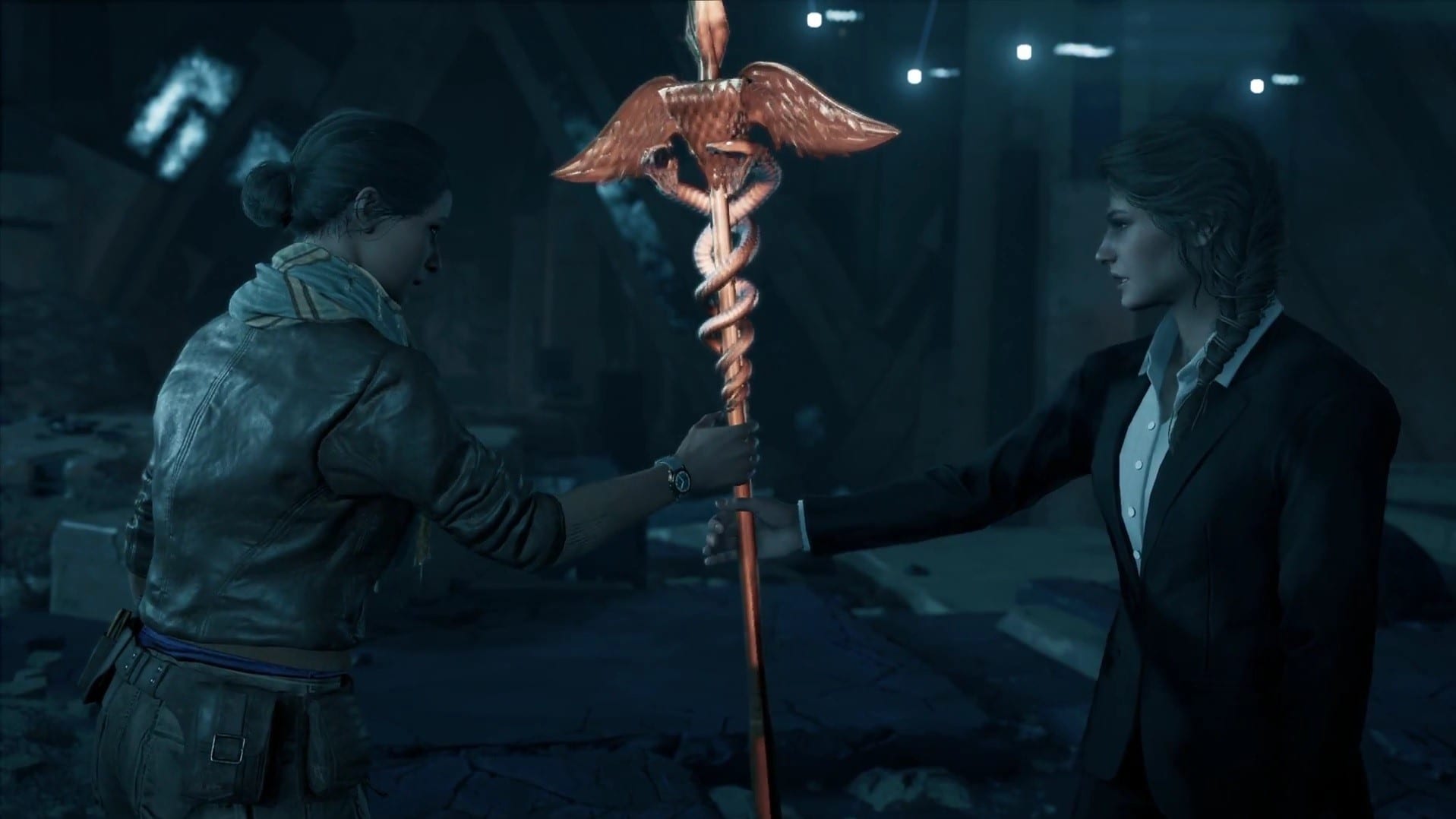
Layla Hassan with Staff of Hermes – Assassin’s Creed Odyssey 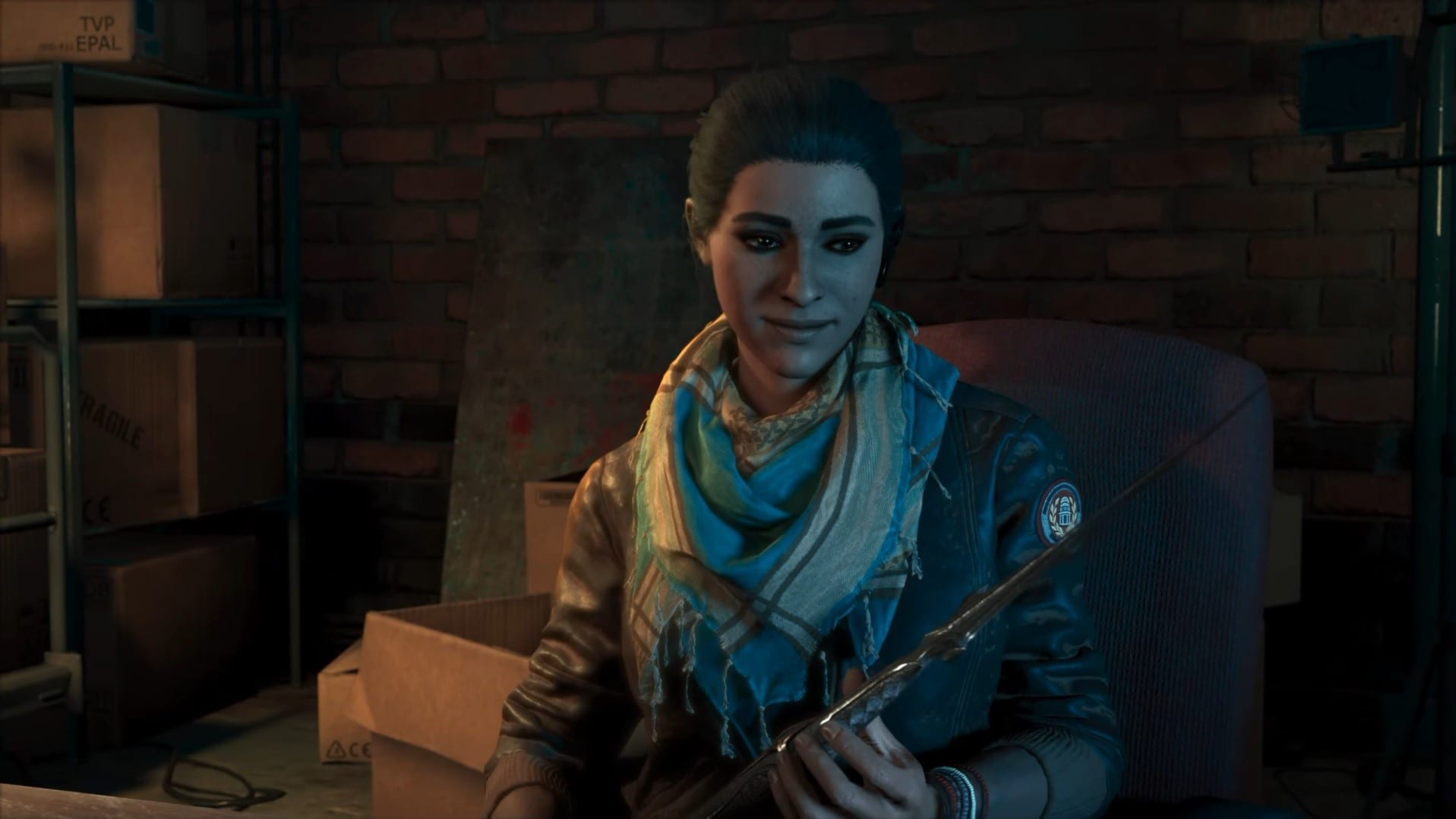
Spear of Leonidas – Assassin’s Creed Odyssey
In my opinion, Odyssey is anything but an Assassin’s Creed game, only sharing the name and superficial mechanics of the franchise. It did have a strong focus on the Isu, a precursor race perceived as ‘Gods’ by people in the past, and one which was introduced all the way back in Assassin’s Creed II. However, the way in which Odyssey handled the Isu was radically different from anything that came before it, marvelling more in fictional mythos than science.
This is where Assassin’s Creed Valhalla sticks its (superhero) landing. Valhalla takes forward the RPG mechanics introduced in Origins and introduces new mechanics that not only work well but also makes sense within the context of the original Assassin’s Creed games. It feels like a proper sequel to Origins rather than Odyssey, which is all good in my eyes.
Story – The Road to Valhalla
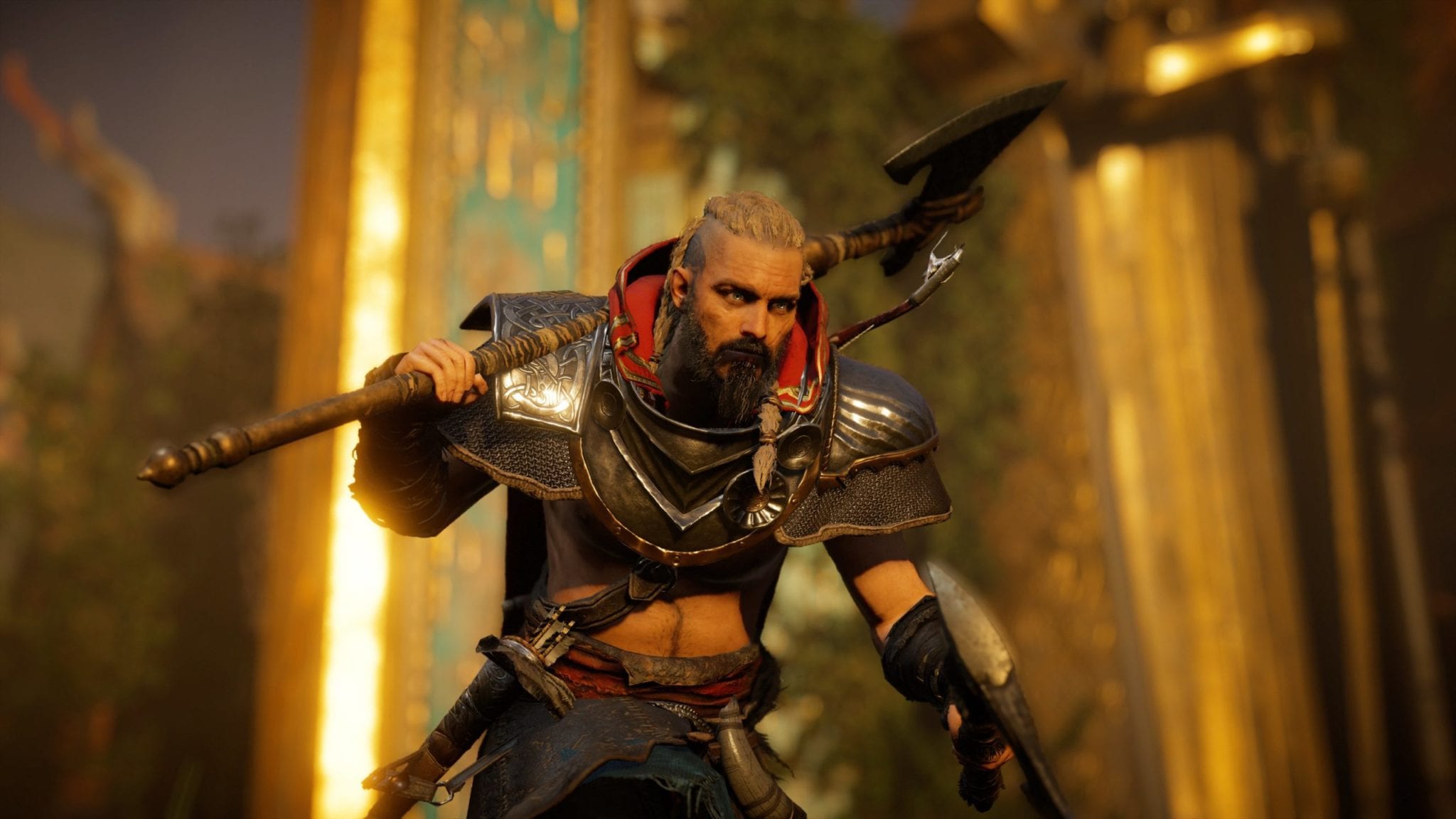
Assassin’s Creed Valhalla follows the story of Eivor, a Viking warrior who, along with his/her foster brother Sigurd, leads his/her Raven Clan to England to make way for a new home. With that said, the game starts off in Norway and spends a good amount of time there, as the seeds of turmoil that lead to them leaving for England are sowed in the first few hours.
At a glance, there are way too many stories running in parallel in Valhalla. But for the completionists out there, fret not, as every story thread in the game has deep and intelligent ties to each other. In general, there are about 4 story threads in the game – Eivor’s quest to conquer England, Eivor’s connection to Odin and subsequently exploring Asgard, the modern-day storyline as well as the connections to the Isu (the ones who came before).
Each of them ties back to others really well, provided you’re smart enough to connect the dots. That’s something that the game is really subtle about, requiring the most dedicated fans to be able to completely make sense. It’s quite similar to the older games actually, leaning more towards sci-fi and mystery rather than full-on fantasy. If you’re all caught up with Assassin’s Creed’s in-universe lore, then you’ll be able to rationalise nearly everything including all mystical encounters.
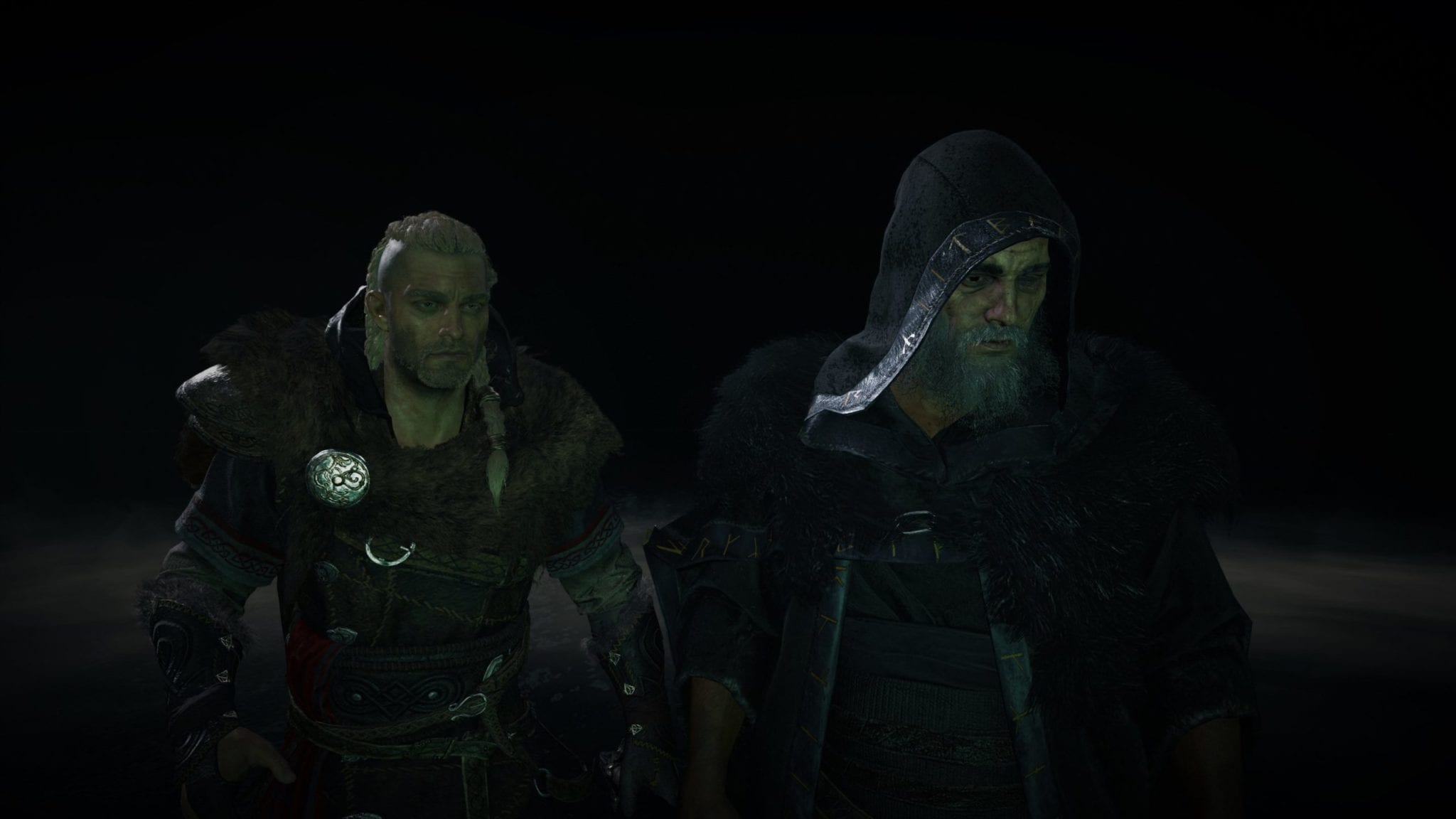
Sigurd himself is a very likeable character, although not without his own flaws. He constantly sees visions of a past life where he sat and drank alongside the Norse gods – a mystery which binds a lot of story threads in Valhalla together. Eivor is haunted by the visions of meeting Odin every time (and outside of) every time he assassinated his/her targets. Like last time, players can choose to play as either male or a female Eivor, although this time you can switch between those choices any time you want. There’s also a 3rd option which lets the Animus decide your appearance, which will keep changing after major arcs in the game. There is a really cool narrative reason for this, but we won’t spoil it here.
Similarly, the modern-day plot here is short but incredibly dense. After finishing the game I had the same feelings that I got after beating the games in the original trilogy. Assassin’s Creed Valhalla ties up the arc that started with Layla in Origins and opens up the door to intriguing possibilities in the future. I haven’t been this excited for the future of Assassin’s Creed since, well, Assassin’s Creed III.
Open World & Exploration
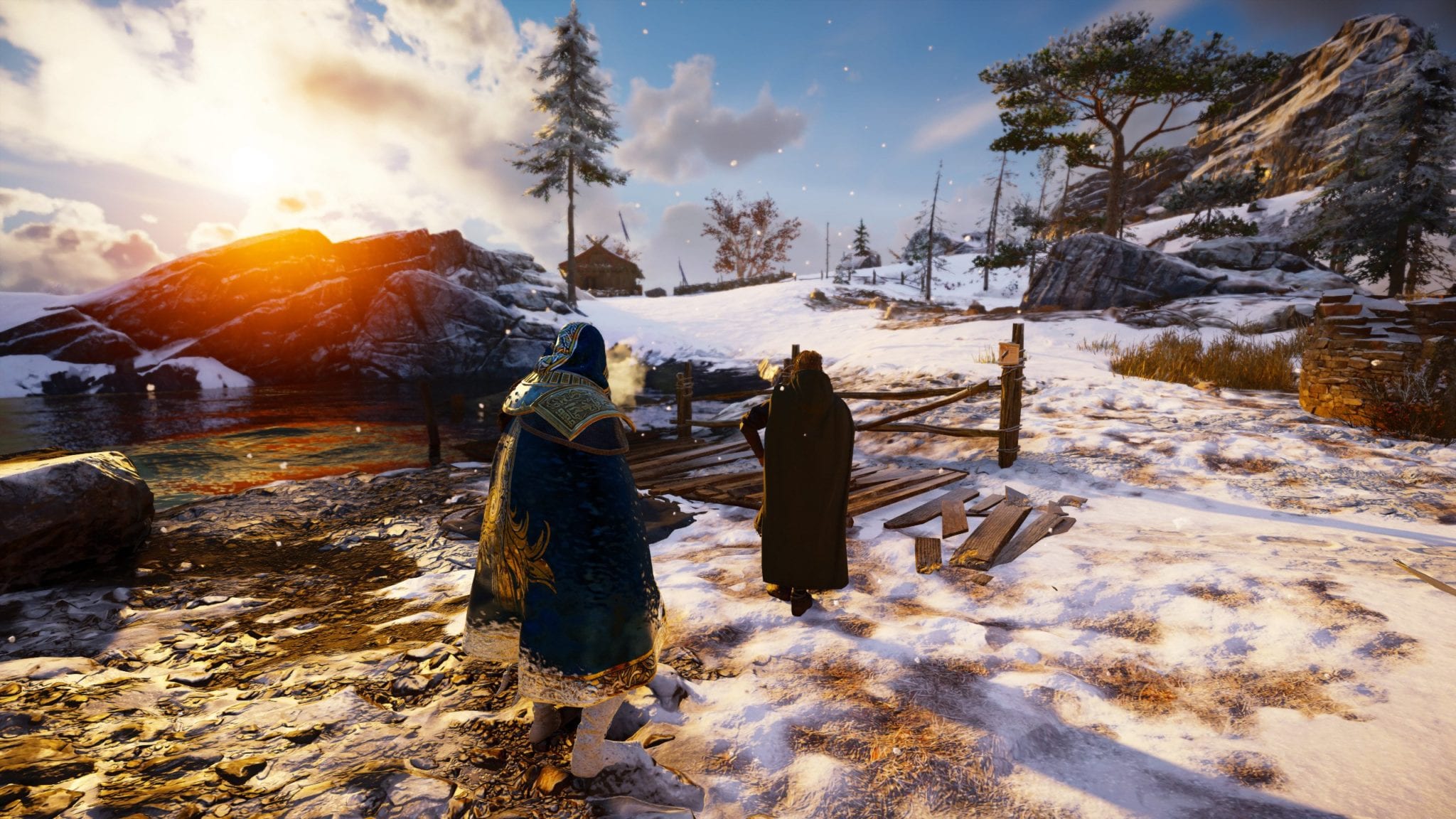
From the starting moments in Norway, it’s made clear just how the developers planned to use a large open world. Instead of just one landmass which was Greece/Egypt, the world of Valhalla is broken up into many different regions, with England serving as a primary location. Aside from that, we have Norway in the prologue, Vinland, and mythical locations like Asgard and Jotunheim, and then there’s a small explorable section in the modern-day too. It all together serves to be about as big as Odyssey’s open world, but it never feels as overwhelming because it’s broken up into different regions altogether.
The content to explore within that open-world has also improved in quality, with the somewhat revamped quest design being as interconnected as it is. Unlike Origins or Odyssey, Assassin’s Creed Valhalla’s quest structure isn’t as linear. You can pledge yourself to any one of the many kingdoms in England, and then visit that region to complete that arc. At the end of any said arc, you guarantee an alliance with that region, and each arc in the game naturally links with one another. As for the ‘main’ story, there are major beats that will only let you progress as you get more alliances.
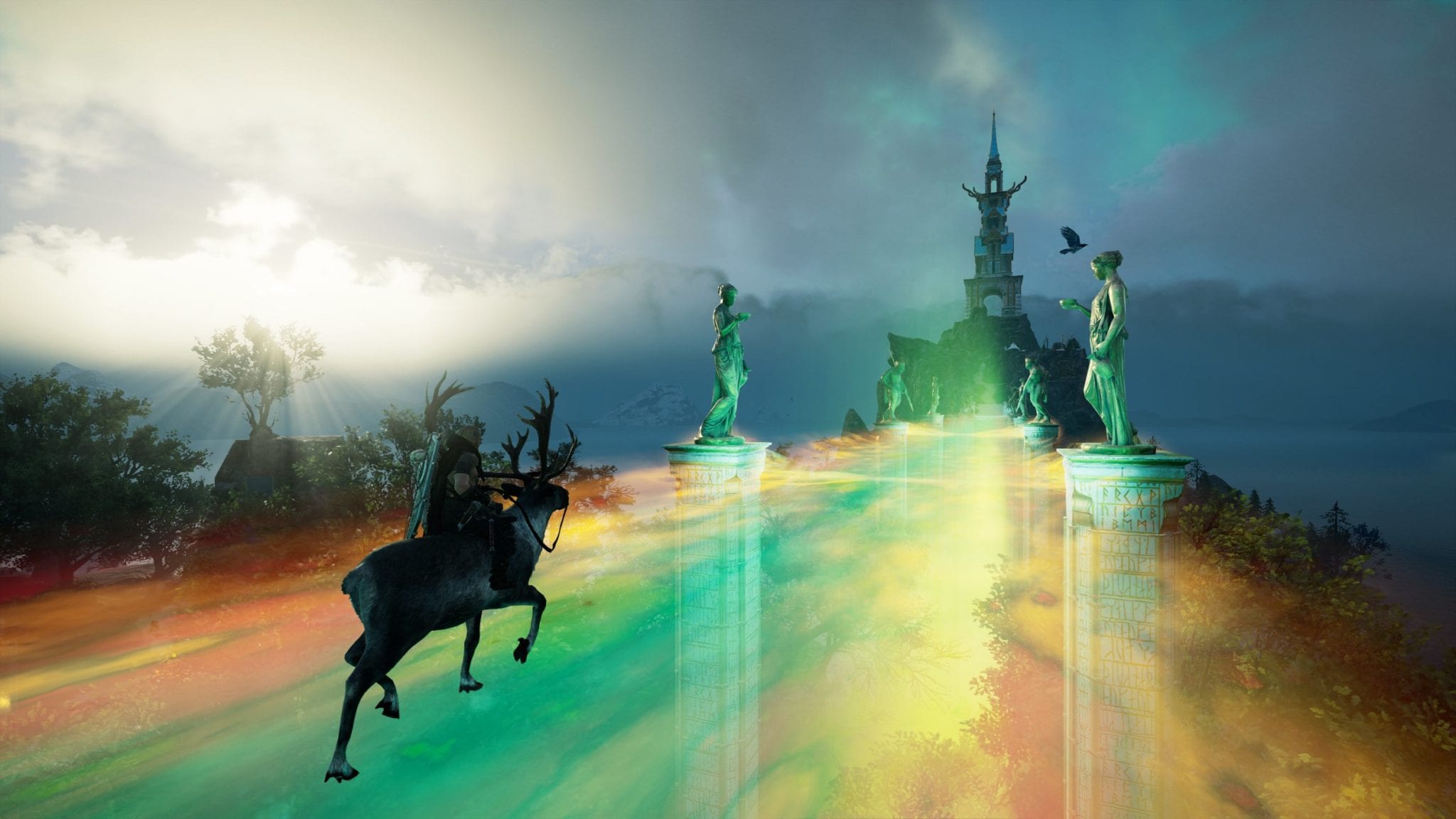
Coming back to the open-world exploration, a lot of elements have been tweaked to offer more immersion. Gone are the ‘go-to A, do task b’ missions from Odyssey, as Valhalla categorizes most locations as having 3 different tiers for exploration – ‘Mysteries’, ‘Wealth’ and ‘Artifacts’. There are also ‘World events’ scattered throughout the maps, which are short, self-contained stories which flesh out the dark ages of England. And then there are other events like Animus anomalies (similar to hidden glyphs from Assassin’s Creed II), and other exotic boss battles which all follow their own side stories.
These new additions are a welcome change, as they really increase the immersion and flesh out the world more naturally. Synin, your friendly raven companion, also sees some new changes from Senu and Ikaros, and for the better. The raven isn’t as ‘overpowered’ as the previous games, as it actively warrants exploration instead of outright telling you where exactly your objective is.
Photo Mode also returns, and as Ubisoft has clearly pushed the Anvil engine to its limits, there are more reasons than ever to use it. Assassin’s Creed Valhalla looks gorgeous, even though it doesn’t boast the same tropical locales of Odyssey. As mentioned above, each location in Valhalla feels wholly unique, and each of them looks just as good. I used the photo mode throughout my playthrough as it never got old, and you can take look yourself as they’re ever-present throughout the body of this review.
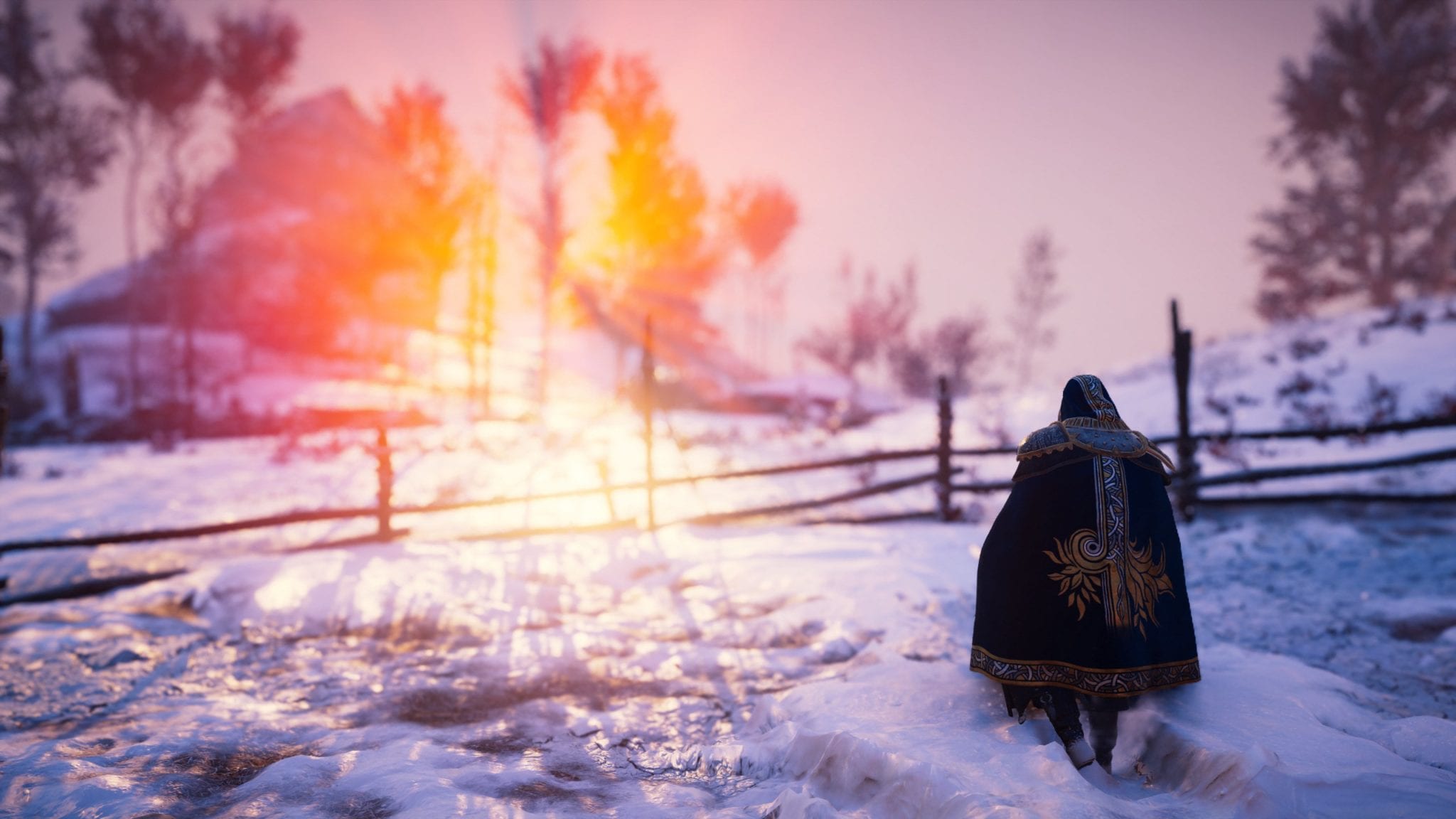
A quick word on PC performance – we saw massive micro-stuttering during the review phase which have now been patched out. However, players on Xbox Series X have since voiced their cries over the game’s tearing issue which happens even on the next-gen version of the game. We hope Ubisoft is listening and can fix the game’s many bugs/performance issues.
Here’s a quick look at performance on PC at various resolutions:
Stealth, Combat and Traversal
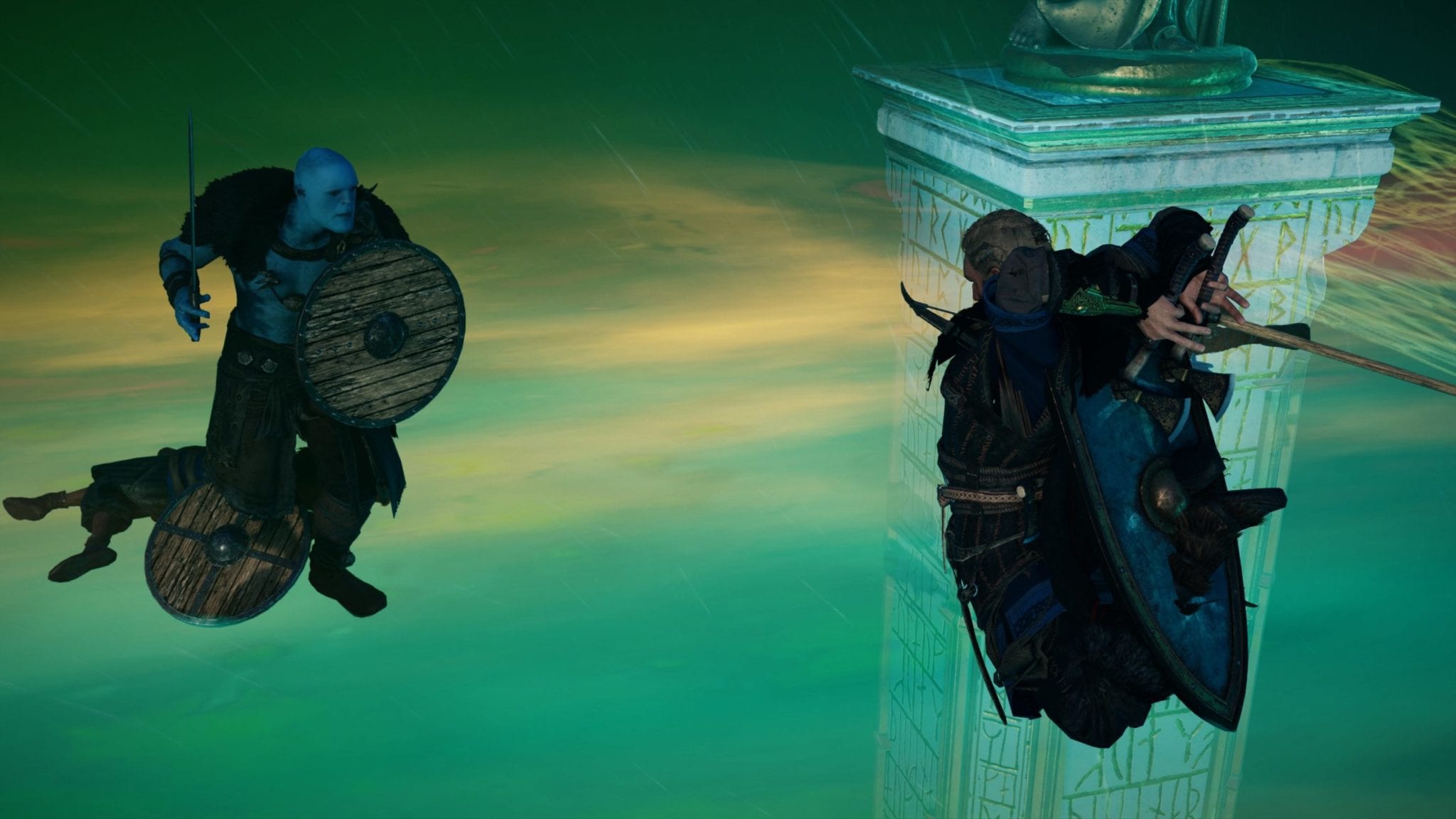
Assassin’s Creed Valhalla uses a similar combat system to Origins, but shakes up and adds new things to make it even more engaging and bloodier. Now you can target individual body parts to deal critical hits, doing which decreases the enemy’s stamina bar, resulting in a final (and glorious) stun attack. I have to appreciate the level of detail that Ubisoft Montreal has gone in to really expand upon the combat, and really every other mechanic in the game. Assassin’s Creed Valhalla features probably the most diverse amount of unique kill animations, all of which suit Eivor’s Viking fighting style pretty well. Stealth animations are also more detailed and reminiscent of the older Assassin’s Creed games.
Coming to abilities and skill trees, those too have been revamped. For one, you can’t “unlock” abilities so much as discover them through exploration, finding new ones each time you discover a ‘Book of knowledge’. The skill tree is more reminiscent of something from Skyrim, which follows a node-based system. You can acquire new pseudo abilities by unlocking other skills around it, and the power scaling is also relatively well-paced. There were times throughout my playthrough where missions would be slightly power-gated, but it wasn’t nearly as bad as it was in Assassin’s Creed Origins or Odyssey. No ‘time-savers’ needed whatsoever.
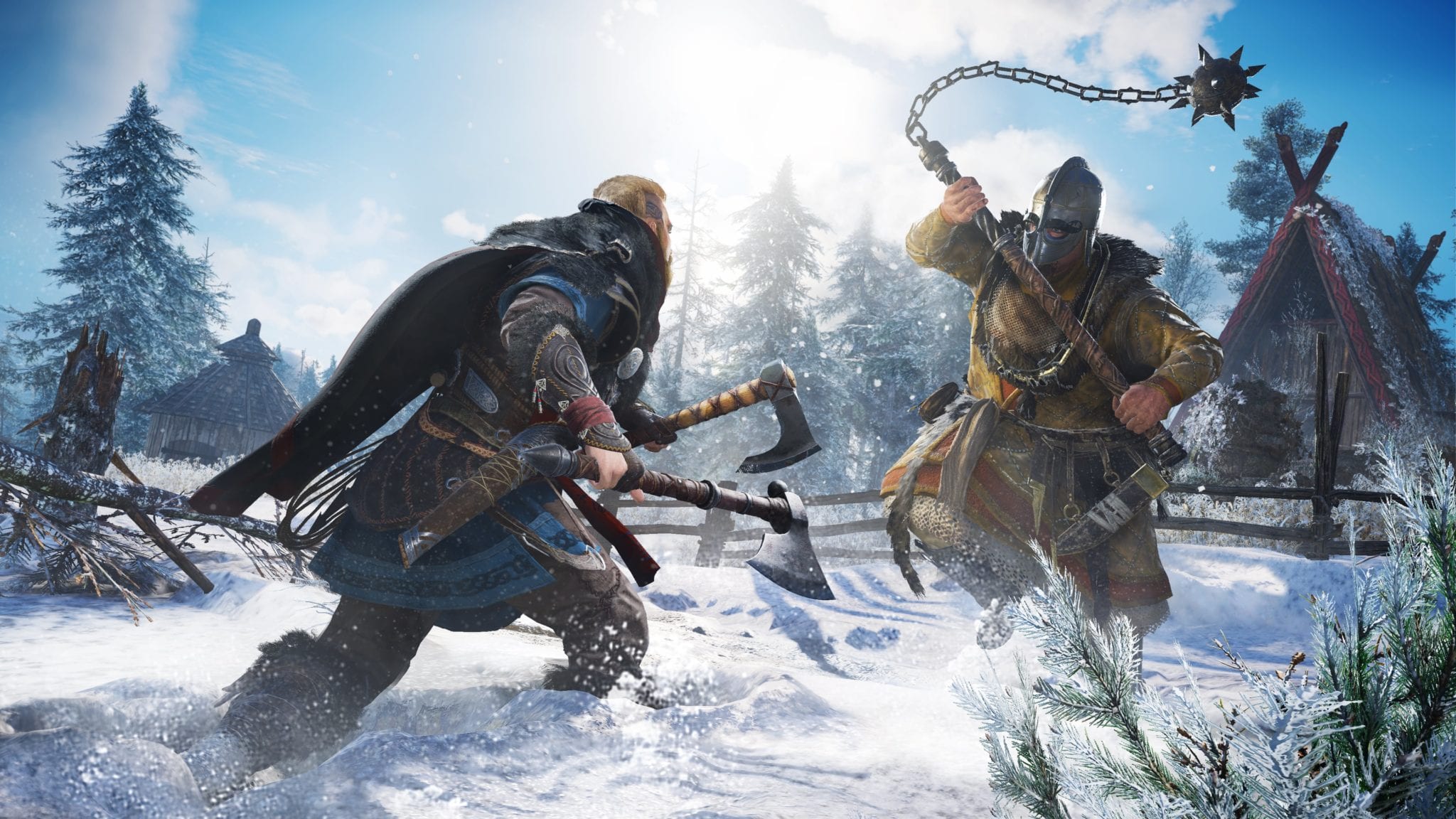
Let’s get back to stealth then, which used to be a core pillar of the Assasin’s Creed franchise. Remember that? Remember when social stealth was such an important part of the franchise. I’m extremely glad to say that yes, it has made its grand return in Valhalla. To enter stealth you can use your cloak where Eivor puts on the signature Assassin hood, and that brings a smile to my face every time he (or she) does it. Stealth kill animations are, as mentioned before, back in fashion, which includes killing from haystacks and ledges. While some of these were present in Origins, the focus from stealth was taken away in Odyssey, one of that games’ many failings (in my opinion).
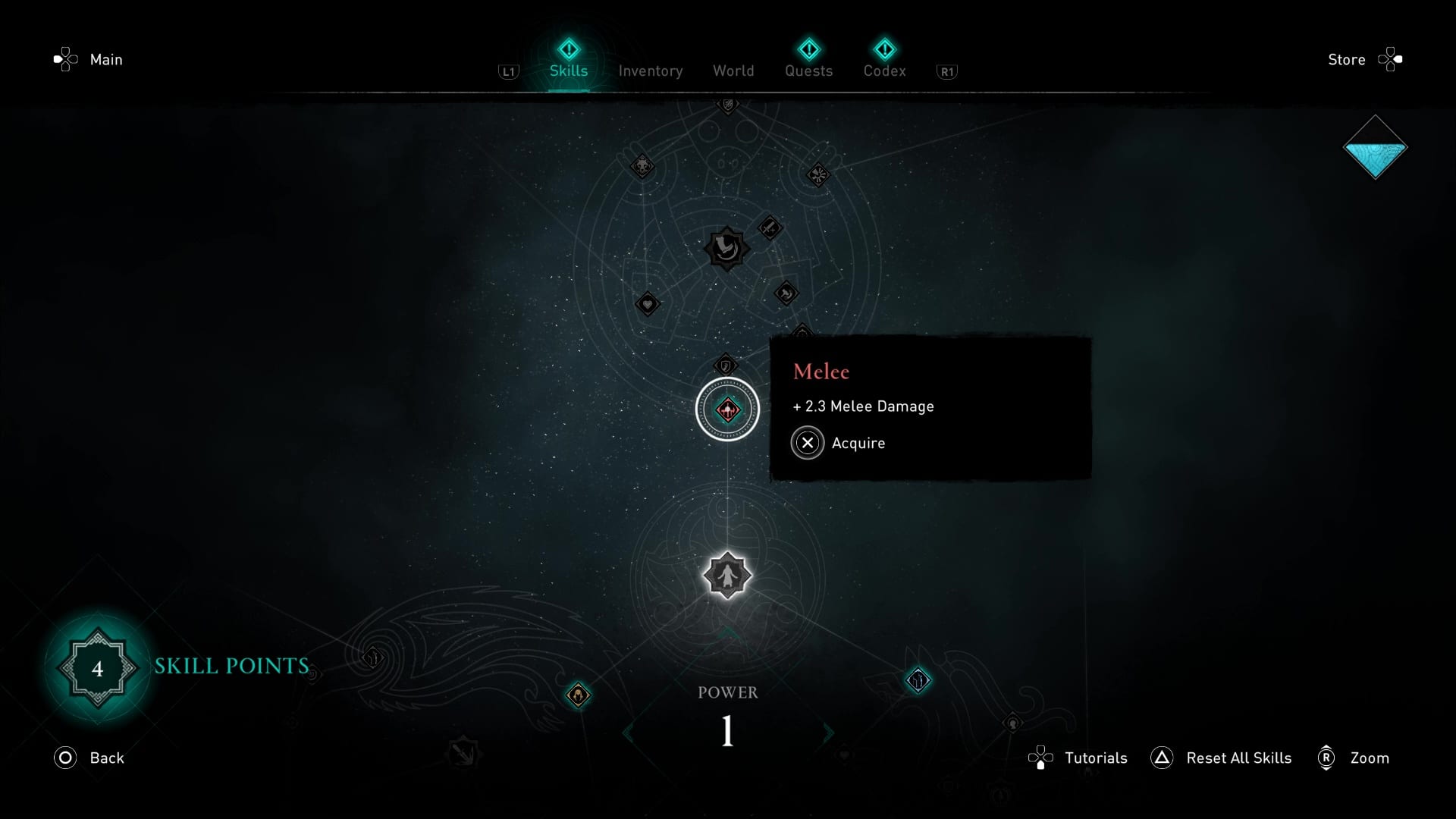
Node Based Skill Tree 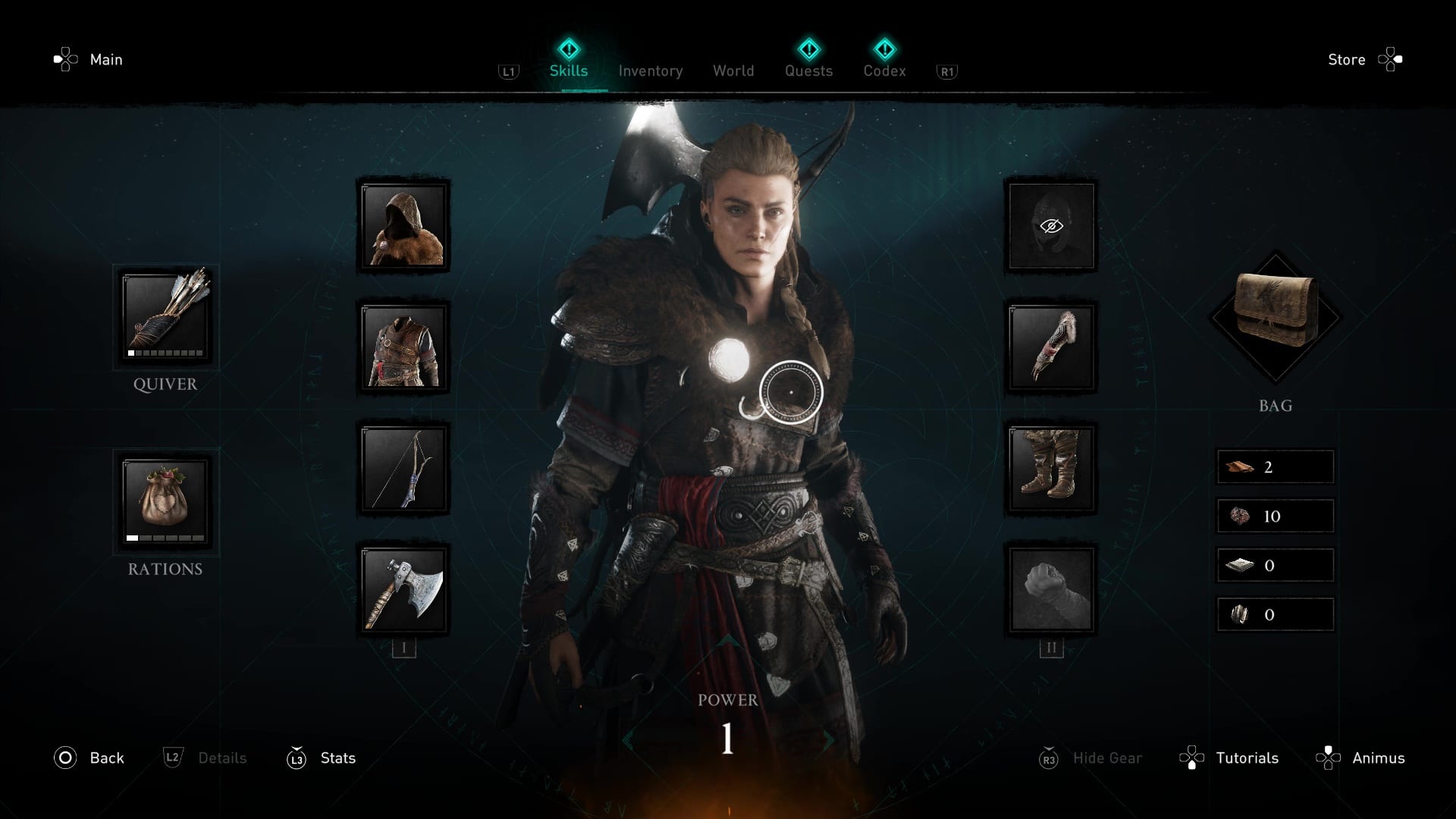
Character Inventory
It wouldn’t be a game about Vikings without raiding and pillaging, as it is introduced as a fun new mechanic. You can raid many locations as you sail the rivers of England on your longboat, and doing so gets you rewards which you can use to upgrade your settlement. It’s a little similar to Assassin’s Creed II’s Monteriggioni. Each act in the game results in a positive sense of progression. I haven’t found a single mini-game or mechanic that’s there just for the sake of being there, and that’s really something to sing praises about. Building and upgrading the settlement is really cool, as it unlocks more rewards/buffs which is useful is other gameplay sections.
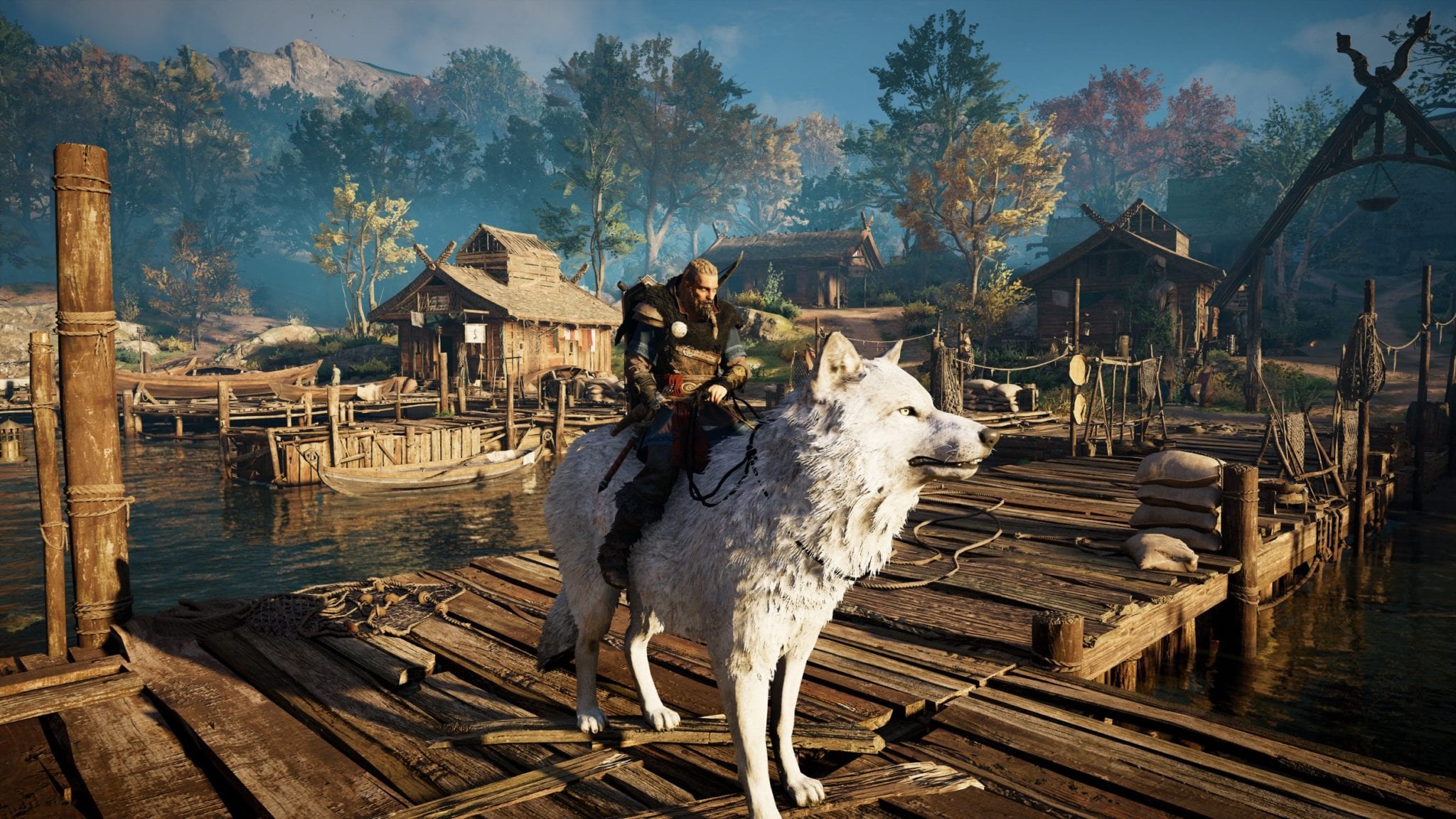
The order of the Ancients also return, with them getting their own dedicated menu page where you can track your progress as you assassinate your way through its ranks. Much like every other story thread in the game, finishing the Order of Ancients also leads to some extremely satisfying revelations (ha!).
I also wanted to give a special mention to Jesper Kyd, Sarah Schachner and Einar Selvik, who all composed the music for the game. I already touched upon this in my first impressions of the game, but bringing these people back along with Darby McDevitt and Ashraf Ismail makes for some of the best (and iconic) talent that an Assassin’s Creed game has ever gotten. The music in the game feels wholly original yet reminiscent of certain tunes from the Ezio trilogy as well as Origins, which well, makes perfect sense given the composers.
Conclusion
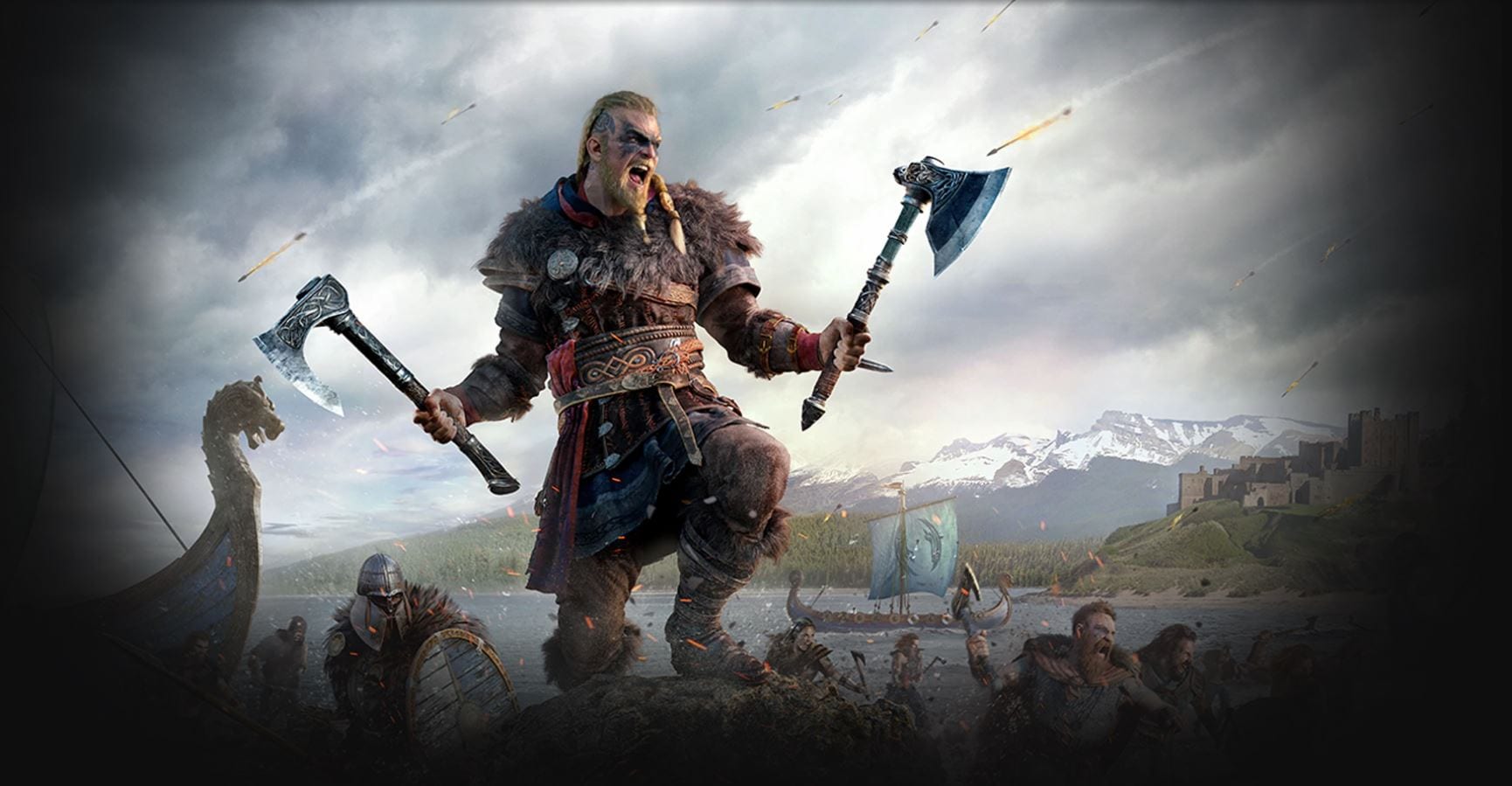
Assassin’s Creed Valhalla is one of the best games in the series, striking the perfect balance between the franchise’s newfound RPG gameplay and a focused narrative that pays respects to its predecessors in meaningful ways. Whether you’re a veteran fan or a new one, Valhalla will have everything you could ask for.


